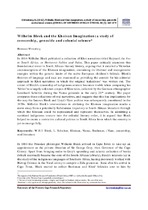Wilhelm Bleek and the Khoisan imagination: a study of censorship, genocide and colonial science
Abstract
In 1864, Wilhelm Bleek published a collection of Khoi narratives titled Reynard the Fox in South
Africa, or Hottentot Fables and Tales. This article critically examines this foundational event in
South African literary history, arguing that it entailed a Victorian circumscription of the
Khoisan imagination, containing its libidinal and transgressive energies within the generic
limits of the naıve European children’s folktale. Bleek’s theories of language and race are
examined as providing the context for his editorial approach to Khoi narratives in which the
original ‘nakedness’ was written out. The extent of Bleek’s censorship of indigenous orature
becomes visible when comparing his ‘fables’ to a largely unknown corpus of Khoi tales,
collected by the German ethnographer Leonhard Schultze during the Nama genocide in the
early twentieth century. The article compares these collections of oral narratives, and suggests
that this has implications for the way the famous Bleek and Lloyd /Xam archive was subsequently
constituted in the 1870s. Wilhelm Bleek’s interventions in civilising the Khoisan imagination
marks a move away from a potentially Rabelaisian trajectory in South African literature through
which the Khoisan could be represented and represent themselves. In admitting a sanitised
indigenous orature into the colonial literary order, it is argued that Bleek helped to create a
restrictive cultural politics in South Africa from which the country is yet to emerge fully.

